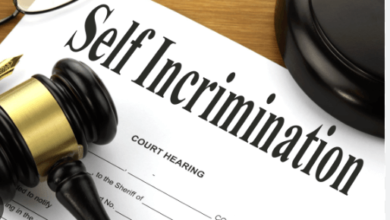Understanding Your Rights When Charged with a crime: Key Legal Principles Explained by Caramanna Friedberg LLP

Getting charged with a criminal offence turns your life into chaos. One minute you’re going about your day, the next you’re dealing with police officers and court dates.
Most people have never needed the services that Caramanna Friedberg LLP provides. These people don’t know basic things about how the system works. The whole process feels designed to confuse regular people who just want to get back to their normal lives.
Staying Silent Protects You
Here’s something nobody tells you clearly enough. You don’t need to answer questions. Any questions. From anyone in law enforcement.
The Charter gives you this protection, but police officers will make you feel like you should talk to them. They act friendly. They say things like “we just need to understand what happened here” or “cooperation always helps your case.”
That’s not true.
Everything you say goes into their report. Later, those words get read in court. Sometimes innocent comments sound guilty when a prosecutor reads them to a jury. You think you’re helping yourself, but you might be creating problems that didn’t exist before.
Getting Legal Help Right Away
You can call a lawyer when they arrest you. This isn’t optional for them to offer. They have to let you make that call.
Some people think they can handle police questions without help. Maybe they watch too many crime shows. Maybe they believe they can explain their way out of trouble. This thinking usually backfires.
Criminal law gets complicated fast. Rules change. Procedures matter. Small details can destroy a case or save it. You wouldn’t fix your own car engine if you didn’t know how engines work. Why would you handle criminal charges without professional help?
If money is tight, duty counsel provides free legal advice. The service isn’t perfect, but it beats facing interrogation alone.
Search and Seizure Rules
Police can’t search your stuff whenever they want. They need warrants or specific legal grounds for most searches.
But the rules get messy quickly. They can search you when they arrest you. They can search your car if they think it contains evidence. The question becomes what counts as “reasonable” grounds for searching.
What looks reasonable to a police officer might not look reasonable to a judge later. This creates grey areas where your rights might get violated. Another reason to get legal help before answering questions or consenting to searches is
See also: Kansas City Traffic Lawyer: Protecting Missouri Drivers From Penalties
Knowing What You’re Charged With
They have to tell you the specific charges. Not just “you’re in trouble” or “we’ll figure it out later.” Exact charges with exact wording.
Charges sometimes change as cases develop. New ones get added. Old ones get dropped. This process can drag on for months. You might start with one charge and end up facing three different ones.
The specific wording matters because different charges carry different penalties. Simple assault versus aggravated assault. Theft under five thousand dollars versus theft over five thousand dollars. These distinctions change everything about your situation and your options.
Presumption of Innocence Means Something
You are innocent until proven guilty. This isn’t just a nice saying. It’s a legal principle that controls how your case works.
The prosecution has to prove its case beyond a reasonable doubt. They can’t just show you probably did something wrong. They need to convince a judge or jury that no reasonable person would doubt your guilt.
Many people forget this and start trying to prove they didn’t do anything wrong. That’s backwards thinking. You don’t have to prove innocence. The Crown prosecutor has to build their entire case against you without your help.
Bail Keeps You Out of Jail
Most people charged with crimes don’t sit in jail while waiting for trial. Bail allows release with certain conditions while your case moves through the courts.
Bail conditions vary based on charges and personal circumstances. You might need to surrender your passport. You might have to avoid certain people or locations. Some conditions make sense for public safety. Others feel excessive or unreasonable.
The disclosure process becomes important here because understanding the evidence against you helps determine appropriate bail conditions. You can challenge conditions that seem too harsh through bail review hearings.
Plea Deals Aren’t Always Bad
Most criminal cases end with plea agreements instead of trials. You plead guilty to some charges in exchange for other charges being dropped or receiving reduced sentences.
This isn’t giving up or admitting defeat. Sometimes, plea deals make strategic sense. But you should never accept deals without first understanding all your options. Prosecutors sometimes offer early deals that sound good but aren’t actually in your best interest.
Effective plea bargaining requires understanding the strength of the case against you. It requires knowing potential penalties if you go to trial and lose. These calculations depend on legal knowledge and courtroom experience, which most people lack.
Charter Applications Can Change Everything
Your Charter rights get violated sometimes during investigations. Police make mistakes. They search without proper grounds. They fail to properly inform you of your rights. They ignore your requests for legal counsel.
Charter applications allow challenges to these violations. When successful, they can exclude evidence, which can even result in charges being dropped completely. However, these applications require specific legal knowledge about procedural requirements and deadlines.
What Happens Next Matters
Getting charged does not make you who you are, but how you react to charges can have a great impact on your future. It is one thing to know rights, and another to defend those rights.
The justice system is fast, and initial errors cannot be corrected in the future. You may be under pressure to get everything sorted out and move on with life. That’s understandable. However, haste in making significant legal judgments is seldom a good thing.
The rights only work to your advantage when you exercise them. The system presupposes that you are familiar with legal procedures when it is obvious that you are not. Seeking professional legal counsel is not an acknowledgement of guilt. It is safeguarding your interests in a complex system that is not created to protect ordinary citizens.







